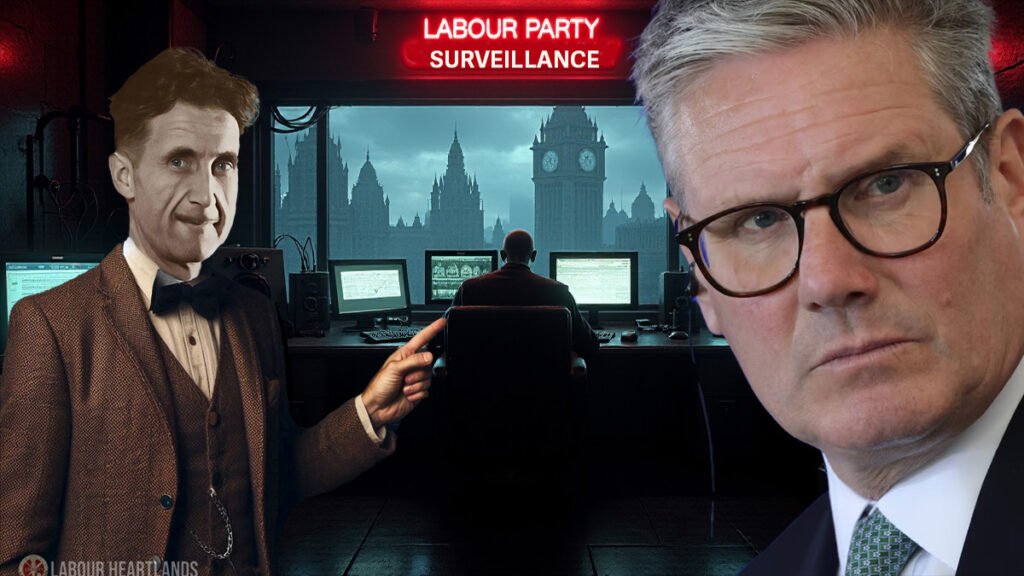When Police Become the Ministry of Truth
In Oceania, thoughtcrime was punishable by death. In Starmer’s Britain, it merely requires five armed officers, a prison cell, and a court order banning you from social media. Graham Linehan discovered this week that George Orwell’s dystopian fiction has become democratic reality, complete with the kind of bureaucratic absurdity that would have made the author weep at his own prescience.
The comedy writer behind Father Ted found himself living through a scene from 1984 when five armed Thought Police intercepted him at Heathrow for the crime of posting three tweets about transgender issues. His arrest for “on suspicion of inciting violence” through words on a screen demonstrates how hate crime legislation has evolved into the perfect mechanism for criminalising wrongthink while maintaining democratic facades.
The Newspeak of “Incitement”

The Metropolitan Police’s charge of “inciting violence” for social media posts represents classic Newspeak, language deliberately designed to obscure meaning rather than communicate it. When criticising someone’s presence in a “female-only space” becomes incitement to violence, when expressing unfashionable opinions transforms into criminal conspiracy, we witness the destruction of language that Orwell warned would precede the destruction of thought itself.
The tweet itself trades on a dark irony: the spectacle of a man self-identifying as a woman while still possessing testicles. It’s gallows humour, a satirical jab at the clash between self-identification and material reality, the very contradiction that hate crime laws now decree must not be laughed at.
In Orwell’s Newspeak, humour that exposes contradictions is the gravest offence of all, because once you laugh at the absurdity, you see through the illusion.

The elastic interpretation of “incitement” allows authorities to criminalise any expression that challenges approved narratives. Today’s thoughtcrime involves questioning gender ideology; tomorrow it might encompass criticising immigration policy, opposing NATO expansion, we know it covers supporting Palestinian rights. The mechanism remains identical: elastic legislation, selective enforcement, and the transformation of legal expression into criminal conspiracy.
The Theatre of Intimidation

Five armed officers for three tweets represents more than resource misallocation; it constitutes psychological warfare designed to terrorise dissidents into silence. The staging was deliberate: maximum visual impact, overwhelming force, medical emergency induced through stress, hospital treatment as consequence of expressing opinions. This represents state terrorism applied to suppress democratic discourse.
The blood pressure spike that sent Linehan into “stroke territory” wasn’t accidental byproduct but intended outcome. When expressing legal opinions in democratic societies requires medical treatment due to state response, the message becomes unmistakable: conform or face consequences that might kill you.
The bail condition banning him from X completes the Orwellian picture. Room 101 required sophisticated torture; modern Britain achieves identical results through judicial decree. When courts can prohibit citizens from accessing legal platforms for expressing unpopular opinions, we witness the transformation of free speech from protected right into revocable privilege.
The Ministry of Truth in Action

The gender critical community that once waited nervously for the knock on the door after posting last night’s tweet has discovered their fears were prophetic in Starmer’s Britain. Linehan’s arrest transforms theoretical concerns into documented reality, express wrongthink about biological sex and face armed police response. Call out genocide in Gaza on social media, and the same mechanisms await: arrest, detention, and digital rehabilitation in the modern equivalent of Room 101, where citizens learn to love Big Brother’s approved narratives about international conflicts.
The precedent now extends beyond any single issue to encompass whatever expression the state deems inconvenient. The machinery of suppression operates identically whether the thoughtcrime involves questioning gender ideology, criticizing foreign policy, or challenging any other aspect of official orthodoxy. The method remains constant: elastic legislation, selective enforcement, and the transformation of legal opinions into criminal conspiracies worthy of armed response.
Downing Street’s response revealed the doublethink that defines contemporary authoritarianism. The Prime Minister’s spokesperson simultaneously claimed police priorities focused on “knife crime and violence against women” while defending the arrest of a comedy writer for social media posts. When governments can maintain contradictory positions without apparent awareness of the contradiction, Orwell’s darkest predictions achieve vindication.
The rejection of “totalitarianism” accusations while defending totalitarian actions demonstrates how modern tyranny operates: not through dramatic announcements but through gradual normalisation of authoritarian measures justified through reasonable-sounding bureaucratic language.
While rape conviction rates remain abysmal, while burglary investigations get abandoned for lack of resources, while anti-social behaviour terrorises working-class communities, the Metropolitan Police deployed five armed officers to arrest a middle-aged comedy writer for expressing opinions millions of Britons share.
This resource allocation reveals the state’s true priorities: protecting ideological orthodoxy matters more than protecting citizens from actual crimes. Physical violence against women receives insufficient attention, but verbal challenges to transgender ideology trigger immediate armed response. The message couldn’t be clearer about which victims the state considers worthy of protection.
The International Recognition
JD Vance’s warning that Britain travels down a “very dark path” reflects international horror at our authoritarian evolution. When American politicians, operating within their own polarised political environment, express concern about British free speech restrictions, we’ve crossed lines that even dysfunctional democracies recognise as dangerous.
The global implications prove severe. Content creators, journalists, and ordinary people worldwide now understand that visiting Britain risks armed arrest for opinions expressed elsewhere. This chilling effect extends far beyond specific cases to encompass anyone who might challenge approved narratives on topics British authorities deem sensitive.
The Cross-Party Alarm

Acts like this feed the Tories and elect Reform. Figures like Robert Jenrick and Claire Coutinho recognised that Linehan’s arrest threatened democratic discourse itself. Even Labour backbencher Jonathan Hinder acknowledged the need for “serious reset” in police priorities. This rare cross-party agreement suggests that the establishment has pushed authoritarianism beyond boundaries that even partisan politicians can defend.
When politicians across the spectrum unite in opposing police actions, the state has revealed its willingness to transcend democratic norms in pursuit of ideological control. The authoritarian impulse proves stronger than party loyalty or electoral calculation.
The Memory Hole in Operation

The broader pattern reveals itself through systematic suppression of dissenting voices while traditional crimes flourish unimpeded. This represents the inversion of law enforcement priorities: protecting comfortable illusions from uncomfortable facts while abandoning citizens to face actual violence without adequate protection.
The same state apparatus that claims insufficient resources for community policing discovers unlimited capacity for monitoring online expression and suppressing wrongthink. Physical crimes with real victims receive minimal attention while digital thoughtcrimes trigger overwhelming response, a priorities inversion that would make the Ministry of Love proud.
The Precedent Established
Linehan’s arrest establishes precedent for criminalising any expression that challenges approved ideological positions. Environmental activists questioning climate orthodoxy, religious believers expressing traditional views, political dissidents criticising governmental actions all become potential targets for identical treatment through identical mechanisms.
The beauty of the system lies in its deniability: authorities can claim they’re simply enforcing existing hate crime legislation while using that legislation to eliminate democratic debate on any topic they choose. The law becomes infinitely elastic, encompassing whatever expression the state finds inconvenient at any particular moment.
Room 101 in the Digital Age
Orwell’s Ministry of Truth required elaborate physical apparatus to monitor and control information. Modern Britain achieves superior results through willing corporate collaboration: social media platforms implement censorship algorithms, telecommunications companies provide surveillance data, and technology corporations serve as enforcement mechanisms for state ideology.
The Online Safety Act created legal frameworks for this cooperation, transforming private companies into extensions of state power while maintaining plausible deniability about direct governmental censorship. Citizens face restriction not through explicit state action but through corporate compliance with governmental pressure, privatised tyranny that proves more efficient than traditional authoritarianism.
All those gender critical people waiting for a knock on the door for last night’s tweet has become reality in Starmer’s Britain.
The Choice Before Us

Winston Smith faced torture until he genuinely believed that two plus two equals five. Modern British citizens face subtler but equally effective pressures: social media bans, employment consequences, reputational destruction, and potential criminal prosecution for expressing mathematical realities about biological sex.
The mechanism differs but the objective remains identical: forcing citizens to publicly accept obvious falsehoods while privately understanding their absurdity. When democratic societies require citizens to affirm statements they know to be untrue or face legal consequences, the transformation into authoritarian states becomes complete.
The Final Warning

The comedy writer may be out on bail, but British democracy remains in the dock, charged with permitting citizens to express opinions that challenge official orthodoxy. The Ministry of Truth operates through hate crime legislation, the Thought Police wear Metropolitan Police uniforms, and Room 101 has been replaced by social media bans and criminal prosecution.
Orwell warned that “if you want a picture of the future, imagine a boot stamping on a human face, forever.” In Starmer’s Britain, that boot wears a police uniform, the face belongs to anyone who challenges approved ideology, and the stamping is justified through laws designed to protect the very people being crushed.
The telescreen was in our pocket all along. The only question is whether enough people retain sufficient memory of freedom to recognise what we’re losing before the loss becomes irreversible. Big Brother is watching, and he’s wearing a Labour Party badge.
Support Independent Journalism Today
Our unwavering dedication is to provide you with unbiased news, diverse perspectives, and insightful opinions. We're on a mission to ensure that those in positions of power are held accountable for their actions, but we can't do it alone. Labour Heartlands is primarily funded by me, Paul Knaggs, and by the generous contributions of readers like you. Your donations keep us going and help us uphold the principles of independent journalism. Join us in our quest for truth, transparency, and accountability – donate today and be a part of our mission!
Like everyone else, we're facing challenges, and we need your help to stay online and continue providing crucial journalism. Every contribution, no matter how small, goes a long way in helping us thrive. By becoming one of our donors, you become a vital part of our mission to uncover the truth and uphold the values of democracy.
While we maintain our independence from political affiliations, we stand united against corruption, injustice, and the erosion of free speech, truth, and democracy. We believe in the power of accurate information in a democracy, and we consider facts non-negotiable.
Your support, no matter the amount, can make a significant impact. Together, we can make a difference and continue our journey toward a more informed and just society.
Thank you for supporting Labour Heartlands












